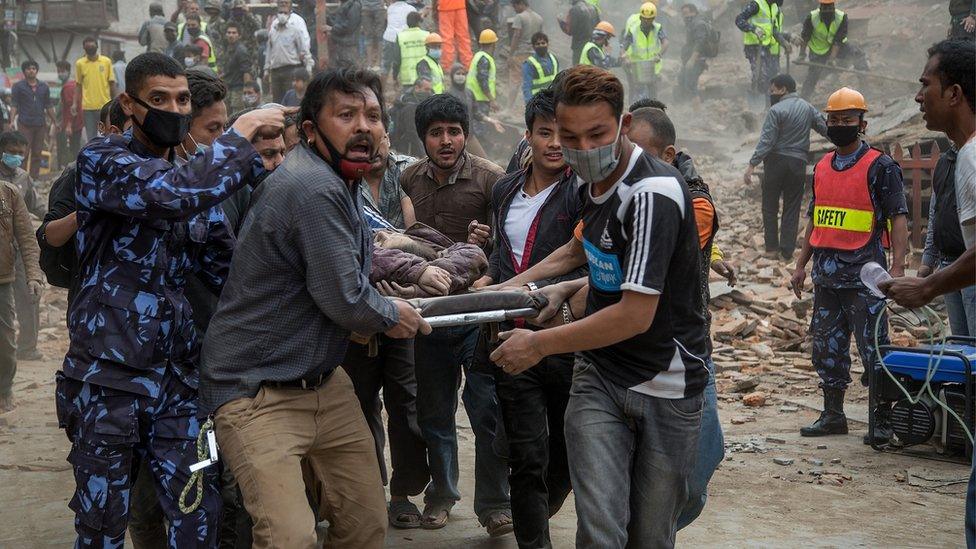Lombok quake: Thousands evacuated after dozens die on Indonesia island
- Published
Moment the quake struck caught on camera
About 20,000 people have lost their homes and many moved to unaffected areas of the Indonesian island of Lombok after a powerful 6.9 magnitude earthquake left nearly 100 people dead.
Boats were sent to evacuate about 2,000 tourists from the nearby Gili islands.
Witnesses spoke of chaos and terror during Sunday's quake, with thousands of buildings damaged, and power and communication lines cut.
Aid agencies said the priority was to provide shelter for residents.
Many are said to be too scared to return to their homes.
The agencies said the impact was far bigger than another quake that hit Lombok last week, killing 16 people.
President Joko Widodo urged the speedy evacuation of casualties, calling for more flights to be sent to the affected areas.
What's the latest on Lombok?
Sutopo Purwo Nugroho, a spokesman for the Indonesian Disaster Management Agency, said that the northern area of Lombok had suffered massive damage.
Three C-130 Hercules transporter aircraft and two helicopters have been deployed to deliver tents and medical aid, but the earthquake has brought down roads and bridges, making areas difficult to reach.
Electricity supply in the worst-affected areas has been cut off and telecommunication networks are not working.
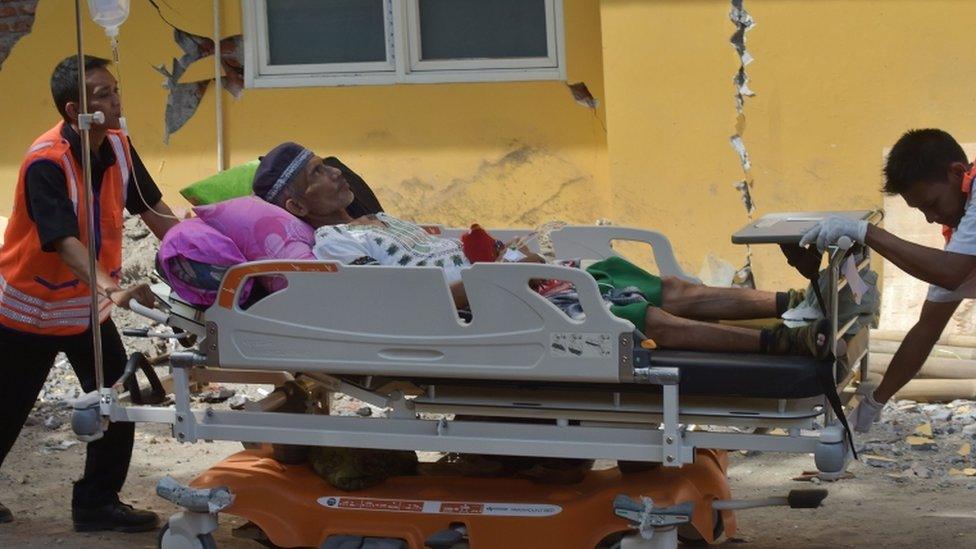
Staff take patients outside as a safety measure at a hospital in Mataram
The death toll stands at 98, all Indonesians, but Mr Sutopo said that number would "definitely increase". At least another 230 people have been injured.
He pointed to the situation at a collapsed mosque in the village of Lading-Lading in north Lombok, where a lack of heavy lifting equipment had made it difficult to locate victims.
One official said 80% of north Lombok had suffered damage.
The main city of Mataram was also badly affected, with medical staff struggling to cope with the injured at the damaged hospitals.
What about the Gili islands?
Situated off the north-west of Lombok and popular with backpackers and divers, they were badly hit, with a number of hotels damaged.
Video and still images showed hundreds of tourists flocking to the beach to be evacuated.
There have been reports of deaths on the islands but these have not been confirmed.
British tourist Mike Bennett told the BBC that thousands of tourists had been taken off by boat, but not everyone had been evacuated by the time night fell on Monday.
"We're here with maybe about 100 people, it's getting dark now. There's no power, there's no water," he said. "We're just going to hold out and see what happens tomorrow."
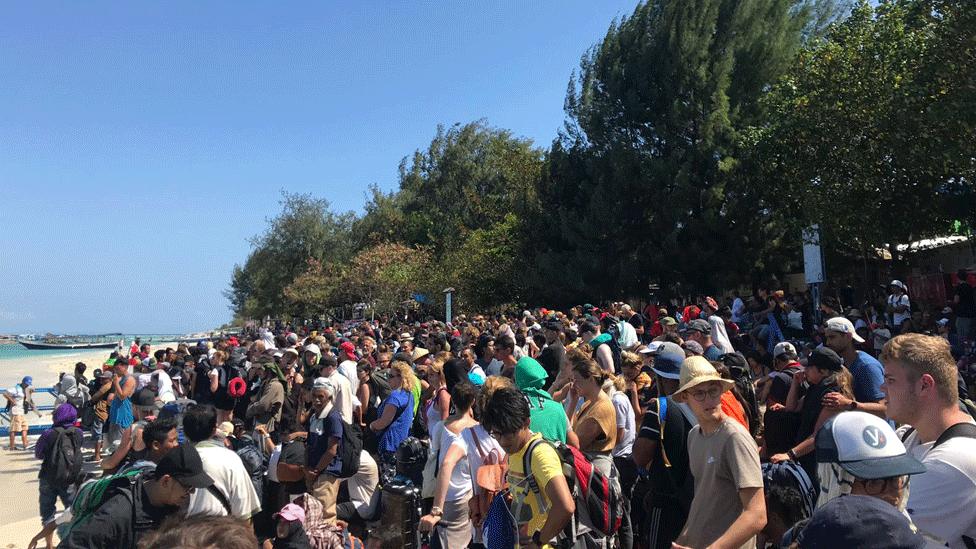
Tourists await evacuation on Gili Trawangan
"We cannot evacuate all of them all at once because we don't have enough capacity on the boats," Muhammad Faozal, of West Nusa Tenggara's tourism agency, told AFP.
"It's understandable they want to leave the Gilis, they are panicking."
The UK Foreign Office said it was working with Indonesian authorities to help British people affected, and that extra flights were being added for people who wished to leave Lombok.
What have victims and witnesses been saying?
Helen Milne told the BBC that her daughter, Laura, from Oxfordshire in the UK, was on the island of Gili Trawangan.
She said: "They are stuck on the island and are reporting rioting, fighting, and people can't get on boats. There's no water, no food, the shops have been ransacked. It's a rapidly deteriorating situation out there for them."
Another Briton on Gili Trawangan, James Kelsall, told the Press Association the subsequent tsunami warning was the most terrifying part.
"All the locals were frantically running and screaming, putting on life jackets. We followed them up to higher ground, which was a steep, uneven climb to the top of a hill in darkness."
The tsunami warning was lifted after a few hours.
Allow X content?
This article contains content provided by X. We ask for your permission before anything is loaded, as they may be using cookies and other technologies. You may want to read X’s cookie policy, external and privacy policy, external before accepting. To view this content choose ‘accept and continue’.

Margret Helgadottir, from Iceland, told Agence France-Presse people screamed as the roof of her hotel on Gili Air collapsed.
"We just froze, thankfully we were outside. Everything went black, it was terrible."
Phillipa Hodge told the BBC she was eating at the Katamaran Hotel Sengiggi just north of Mataram, with friends.
"The lights went out... that's when it became chaotic. People were falling over each other trying to get out, and glass was shattering. We felt debris fall on to us.
"I couldn't see my partner and I was shouting his name. Finally we found each other and he had blood all over his face and shirt."
And the aid agencies?
Dini Widiastuti, executive director of Plan International Indonesia, told the BBC that the top priority was to provide shelter.
"Thousands of people, including children, are still just out in the fields, not properly protected. The impact is very widespread in Lombok and actually this is bigger than the first earthquake last week, so it is difficult."
Meili Narti, from Oxfam, said the government was trying to set up centres to which people could safely evacuate, but colleagues were saying some people did not have sufficient food, water or shelter.
What about Bali?
At least one death has been reported unofficially but it has not been confirmed.
The airport has suffered some damage but is operating.
The quake was felt for several seconds. One worker in Denpasar described the scene to the BBC.
"They were initially just little shocks but then they started to get bigger and bigger and people started to shout 'earthquake', then all the staff panicked and rushed out of the building," he said.
Model and presenter Chrissy Teigen, who is on holiday in Bali, described 15 seconds of a tremor, followed by "so many aftershocks".
Gary Barlow, best known as lead singer of Take That, said he had been in seven quakes and this was the worst:
Allow X content?
This article contains content provided by X. We ask for your permission before anything is loaded, as they may be using cookies and other technologies. You may want to read X’s cookie policy, external and privacy policy, external before accepting. To view this content choose ‘accept and continue’.

What are the quake details?
The earthquake was of magnitude 6.9, according to the US Geological Survey, external.
It struck at 19:46 local time (11:46 GMT) on Sunday at a fairly shallow depth of 31km (19 miles).
There have been more than 130 aftershocks since the quake hit.
Lombok is a roughly 4,500 sq km (1,700 sq miles) island east of the slightly larger island of Bali.


Indonesia is prone to earthquakes because it lies on the Ring of Fire - the line of frequent quakes and volcanic eruptions that circles virtually the entire Pacific rim.
More than half of the world's active volcanoes above sea level are part of the ring.
- Published31 July 2018
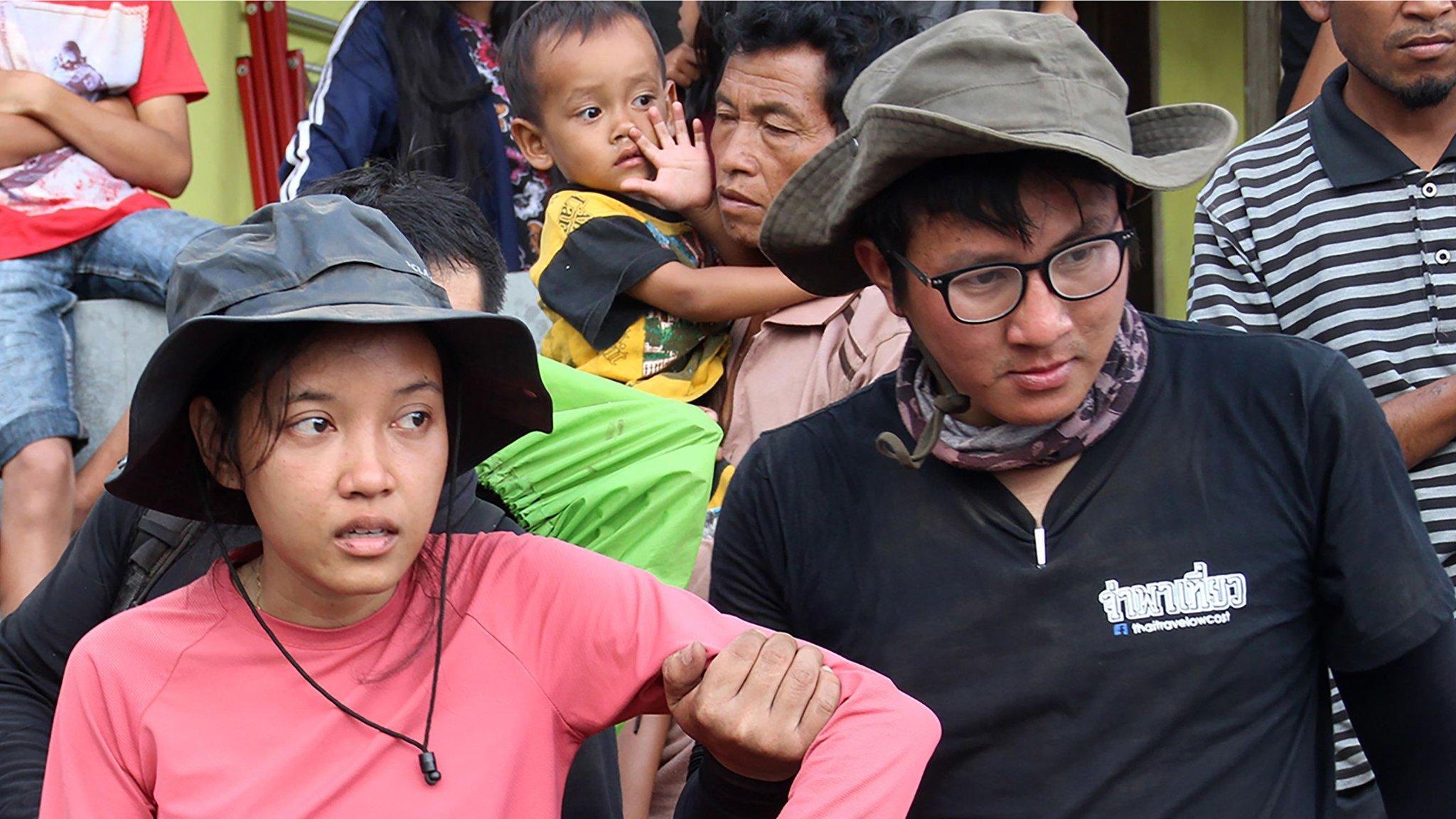
- Published29 July 2018
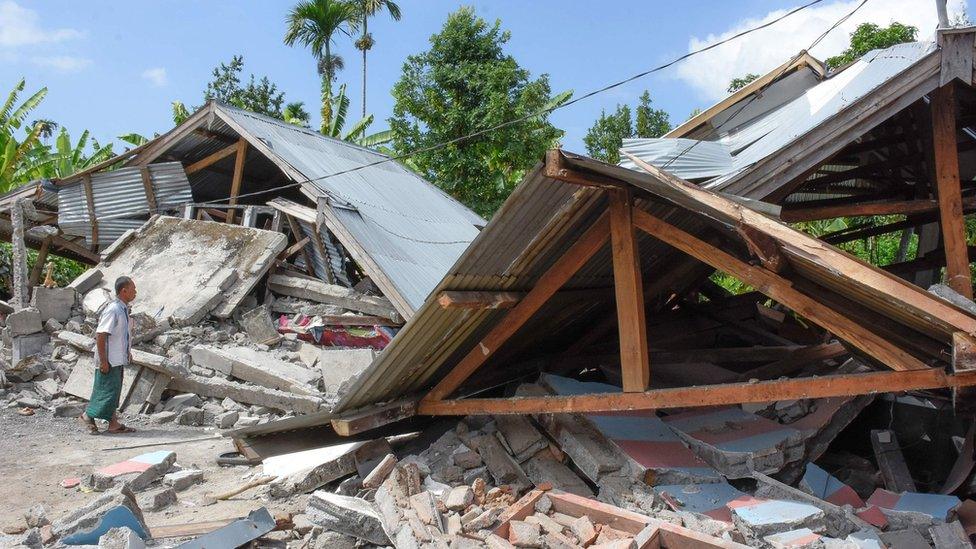
- Published24 March 2018
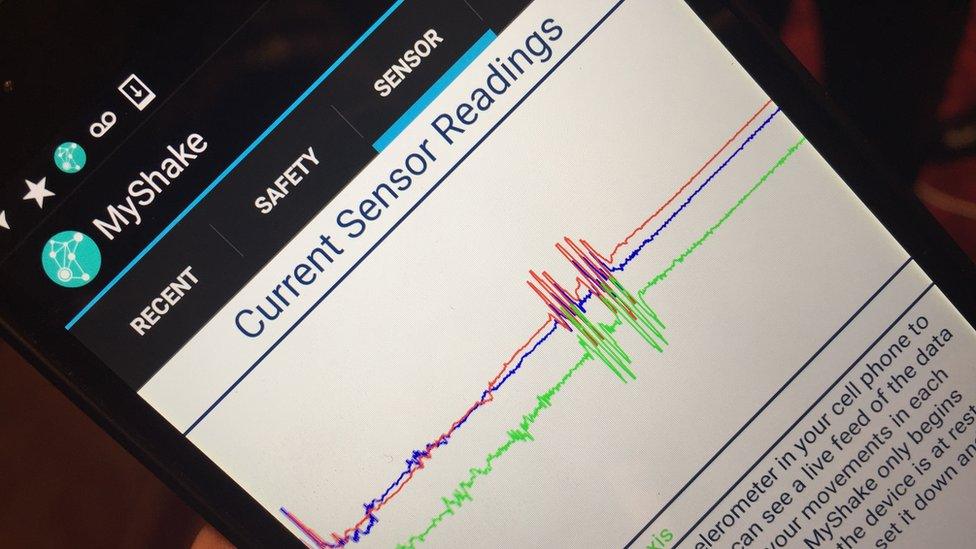
- Published22 June 2022
